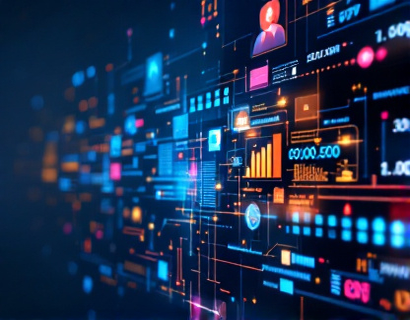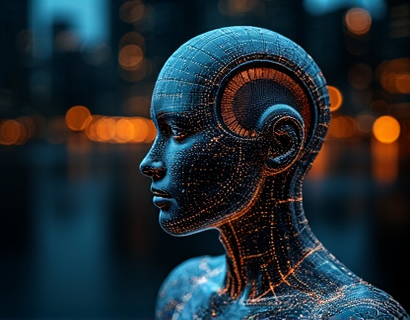Unlocking Next-Gen Productivity with Advanced Digital Tools: The Synergy of Crypto and AI
The digital age has ushered in a revolution in productivity tools, combining the transformative power of cryptocurrency and artificial intelligence to create unprecedented efficiency and streamlined workflows. For tech-savvy professionals and early adopters, the intersection of these two technologies offers a wealth of opportunities to enhance productivity and redefine how tasks are managed and completed. This article delves into the concept of crypto AI synergy, exploring how the integration of blockchain technology and machine learning can unlock next-generation productivity solutions.
The foundation of this synergy lies in the unique properties of cryptocurrency, which provide a decentralized, secure, and transparent environment for transactions and data management. When combined with the advanced capabilities of AI, the potential for innovation becomes vast. AI can process and analyze vast amounts of data, identify patterns, and make predictions, all of which can be leveraged to optimize various aspects of digital workflows. In this context, crypto AI synergy refers to the strategic use of AI-driven tools and platforms that operate on blockchain networks, enhancing the functionality and security of digital productivity solutions.
Understanding Cryptocurrency and AI
To fully appreciate the crypto AI synergy, it's essential to understand the basics of both cryptocurrency and AI. Cryptocurrency, such as Bitcoin and Ethereum, is a digital or virtual currency that uses cryptography for security and operates on a decentralized network. This decentralized nature eliminates the need for intermediaries, reducing transaction costs and increasing transparency. The underlying blockchain technology ensures that transactions are immutable and verifiable, providing a robust foundation for trustless interactions.
Artificial intelligence, on the other hand, encompasses a range of technologies that enable machines to perform tasks that traditionally required human intelligence. These tasks include learning from data, recognizing patterns, making decisions, and performing actions. Machine learning, a subset of AI, focuses on building systems that can learn and improve from experience without being explicitly programmed. When applied to productivity tools, AI can automate repetitive tasks, provide intelligent recommendations, and enhance decision-making processes.
Enhancing Task Management with AI
One of the most immediate benefits of integrating AI into productivity tools is the enhancement of task management. AI-driven task managers can analyze user behavior, predict deadlines, and prioritize tasks based on urgency and importance. For instance, an AI-powered task management tool can learn from a user's past actions to suggest the best time to tackle certain tasks, ensuring optimal productivity. It can also automatically assign tasks to team members based on their availability and workload, reducing the administrative burden and ensuring that projects stay on track.
Moreover, AI can integrate with calendar applications to create smart schedules that account for meeting durations, travel time, and personal preferences. This level of customization ensures that users can focus on their core work without the distraction of constant scheduling conflicts. The ability of AI to handle complex scheduling and task prioritization frees up valuable time for professionals to concentrate on high-value activities.
Streamlining Communication and Collaboration
Effective communication and collaboration are critical components of modern productivity. AI-powered communication tools can significantly enhance these aspects by providing intelligent assistance and automating routine tasks. For example, AI-driven chatbots can handle initial customer inquiries, freeing up human agents to focus on more complex issues. In a corporate setting, AI can analyze communication patterns to identify bottlenecks and suggest improvements, such as optimizing meeting frequencies or refining project update workflows.
Collaboration platforms enhanced by AI can offer features like real-time document editing with intelligent suggestions, automated meeting summaries, and action item assignments. These tools can also facilitate better team coordination by analyzing project data and providing insights into progress and potential roadblocks. The integration of blockchain ensures that all collaboration data is secure and tamper-proof, building trust among team members and stakeholders.
Optimizing Content Creation and Management
Content creation and management are crucial for businesses and individuals looking to establish a strong online presence. AI-driven content tools can assist in generating high-quality content, optimizing it for search engines, and scheduling its publication. For instance, AI can analyze audience preferences and trending topics to suggest content ideas, automate the writing process, and even generate visual content like infographics and videos. This not only saves time but also ensures that content is relevant and engaging.
Content management systems (CMS) enhanced by AI can further streamline the process by automatically categorizing and tagging content, improving searchability and organization. AI can also monitor the performance of published content, providing insights into engagement metrics and suggesting adjustments to improve performance. Blockchain technology ensures that content ownership and rights management are handled transparently and securely, reducing the risk of unauthorized use or plagiarism.
Automating Financial and Administrative Tasks
The integration of cryptocurrency and AI in productivity tools extends to financial and administrative tasks, offering a seamless and secure experience. AI-driven accounting software can automate invoicing, expense tracking, and tax calculations, reducing the risk of errors and saving time. When paired with cryptocurrency, these tools can facilitate seamless payments and transactions, eliminating the need for traditional banking systems and reducing transaction fees.
Smart contracts, a key feature of blockchain technology, can automate and enforce contractual agreements, ensuring that all parties adhere to the terms without the need for intermediaries. This not only speeds up processes but also enhances trust and accountability. For businesses operating globally, the use of stablecoins and other cryptocurrencies can simplify cross-border transactions, providing a more efficient and cost-effective solution.
Enhancing Cybersecurity and Data Privacy
In an era where data breaches and cyber threats are increasingly common, the combination of AI and blockchain offers robust solutions for enhancing cybersecurity and data privacy. AI can detect and respond to potential threats in real-time, analyzing patterns and anomalies to identify and mitigate risks before they become significant issues. Blockchain's inherent security features, such as immutability and decentralization, provide a solid foundation for protecting sensitive data.
Identity verification and access control can be significantly improved through the use of blockchain and AI. Decentralized identity solutions can give users control over their personal data, allowing them to share information selectively and securely. AI can enhance this process by verifying identities through biometric data and behavioral analysis, ensuring that only authorized users access sensitive systems and data.
Future Prospects and Challenges
The potential of crypto AI synergy in enhancing productivity is vast, but it also comes with challenges that need to be addressed. One of the primary challenges is the technical complexity involved in integrating these advanced technologies. Developers and businesses must invest in building the necessary expertise and infrastructure to fully leverage the benefits of crypto AI solutions. Additionally, regulatory uncertainties surrounding cryptocurrency and AI can pose risks, requiring careful navigation and compliance.
Despite these challenges, the future looks promising. As more organizations adopt and innovate with crypto AI technologies, the ecosystem will continue to mature, leading to more user-friendly and accessible solutions. The synergy between cryptocurrency and AI has the potential to revolutionize productivity, making it more efficient, secure, and tailored to the needs of modern professionals.
In conclusion, the integration of cryptocurrency and AI represents a powerful force in the realm of digital productivity. By leveraging the strengths of both technologies, we can create advanced tools that streamline tasks, enhance collaboration, and ensure data security. For tech-savvy professionals and early adopters, embracing this synergy can lead to significant improvements in productivity and efficiency, paving the way for a more connected and productive digital future.










































